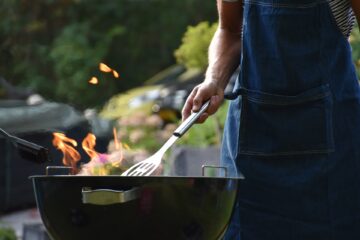When it comes to cooking meat, it’s important to understand how the weight can change during the cooking process. One common question that arises is, “how much weight does a burger lose when cooked?” Knowing the answer to this question can help you better understand how much meat to purchase, and how to properly cook and season your burgers for the best results. In this article, we’ll explore the factors that affect the weight of a burger when cooked and provide tips on how to minimize weight loss.
Understanding Burger Cooking and Weight Changes
When cooking a burger, several changes occur in the meat’s composition that may result in weight loss. One of the most significant changes that happen is that the burger’s fat content reduces when cooked. As the burger cooks, fat drips from the meat and into the grill, and some of the water in the meat evaporates, leading to weight loss. The amount of weight loss can depend on various factors, including the type of meat used, the cooking method, and the burger’s thickness. Understanding these factors can help you determine the expected weight loss when cooking your burger.
How Much Weight Does A Burger Lose When Cooked?
Burgers are one of the most popular foods in the world and can be cooked in a variety of ways. The weight of a burger can change significantly during the cooking process, depending on several factors. On average, a raw burger patty will lose about 25% of its weight after cooking, but this can vary based on the type of meat, the cooking method, and the doneness of the burger.
The amount of weight lost during cooking is largely due to the moisture content of the meat. As a burger cooks, the heat causes the moisture in the meat to evaporate, resulting in a loss of weight. Additionally, some of the fat in the meat may also render off, further contributing to the weight loss.
It is important to note that the weight loss during cooking does not necessarily mean a loss of flavor or quality. In fact, some people prefer their burgers cooked well-done, which can result in a greater weight loss but a more flavorful and crispy texture.
Overall, it is difficult to give an exact number for how much weight a burger will lose during cooking, as it can vary based on many factors. However, as a general rule of thumb, expect a raw burger patty to lose about 25% of its weight after cooking.
Factors That Affect Burger Weight Loss When Cooking
Several factors can affect the weight loss of a burger when cooking. One of the main factors is the type of meat used. Burgers made from leaner meats, such as turkey or chicken, tend to lose less weight than burgers made from fattier meats, such as beef or pork. The fat content in the meat can cause it to shrink and lose more weight during cooking.
Another factor that can affect burger weight loss is the cooking method. Grilling or broiling burgers over high heat can cause more weight loss than cooking them in a pan or on a griddle. This is because the high heat can cause the moisture in the burger to evaporate quickly, leading to more weight loss.
The thickness of the burger patty can also affect its weight loss during cooking. Thicker patties tend to lose less weight than thinner ones because they retain more moisture.
Lastly, the way the burger is handled during cooking can also affect its weight loss. Pressing down on the burger with a spatula can squeeze out moisture and cause it to lose more weight. It’s best to avoid pressing down on the burger and let it cook undisturbed to minimize weight loss.
Tips for Minimizing Burger Weight Loss
When it comes to minimizing weight loss in burgers during cooking, there are a few tips that can help.
Firstly, choosing the right type of meat can make a difference. A leaner meat like ground turkey or chicken will have less fat to lose during cooking, resulting in less weight loss overall. Additionally, choosing a thicker patty can also help, as it will retain more moisture and fat during cooking.
Another important factor is the cooking method. Grilling and pan-searing are both great options for burgers, as they allow the fat to drip off the burger and not be absorbed back in, resulting in less weight loss. Steaming or boiling, on the other hand, can lead to more weight loss as the fat and moisture is retained in the meat.
Finally, it’s important to avoid pressing down on the burger while cooking. This can cause the juices to be squeezed out, resulting in more weight loss and a drier burger.
By choosing the right meat, cooking method, and avoiding pressing down on the patty, it’s possible to minimize weight loss in burgers during cooking.
The Nutritional Value of Cooked Burgers
When it comes to the nutritional value of cooked burgers, it depends on the type of meat used and how it was cooked. Beef burgers are a popular option, and they are a good source of protein, iron, and other essential nutrients. However, they can also be high in fat and calories, depending on the type of beef used and how it’s cooked.
If you’re looking for a healthier option, turkey burgers can be a good choice. They are lower in fat and calories compared to beef burgers, but still provide a good source of protein. Veggie burgers made from beans or other plant-based ingredients can also be a nutritious option for those following a vegetarian or vegan diet.
It’s important to note that adding cheese, bacon, and other toppings can significantly increase the calorie and fat content of a burger. Additionally, cooking methods like deep-frying can also add unhealthy fats and calories.
Overall, if you’re looking to make a burger a healthy meal option, choose leaner meats or plant-based options, skip the high-calorie toppings, and opt for grilling or baking instead of frying.
Conclusion
In conclusion, burgers can lose anywhere from 15% to 25% of their weight during the cooking process, depending on various factors such as the type of meat, the cooking method, and the initial thickness of the patty. While this may seem like a significant amount, it’s important to keep in mind that the nutritional value of the burger remains largely unchanged. By selecting leaner cuts of meat, cooking on a lower heat, and avoiding pressing down on the patty during cooking, you can minimize weight loss and enjoy a delicious and nutritious burger.





